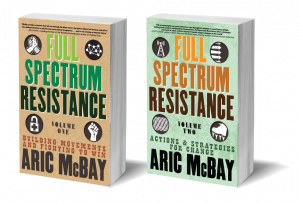We fight because there’s nowhere left to run. Some people say to me: “Sure, I agree that the system is terrible and it’s destroying the planet. But it’s too big to change. Shouldn’t we just build alternative communities and try to weather the storm as best we can?”
I agree that the dominant culture is not going to change—it needs to be disrupted and dismantled. But withdrawal as the sole strategy will fail, because there is nowhere left to run to. The dominant culture is global. Its reach and destructiveness are global. It expands ceaselessly to gobble up land, resources, and cultures.
Let me be very clear that when I say this I am not dismissing the value of building alternatives. I live on an organic family farm. We grow our own food. We restore habitat and build soil. We build local community. All of these are important and worthwhile. But if we can’t stop runaway global warming (among other catastrophes) then all of our work, and the land itself, will be destroyed.
The primary problem with the dominant culture is not that it is sinful or corrupt, but that it is unjust and voracious. We must be more than an alternative—we must be an opposition.
Focusing on withdrawal as the primary solution ignores the fact the planet was covered with alternative—that is, Indigenous—cultures for countless millennia. Many or most of these cultures used participatory decision-making and placed a high value on equality and justice. The empires and colonizers have spent many centuries trying to exterminate Indigenous people and steal their land. Historically they did this not with high-altitude bombers and cruise missiles, but face-to-face, by the sword. Yet not a single empire in history was reformed by encountering the good example of an alternative culture.
I have lived on the land and grown my own food for some years and am reasonably good at it. But I am a rank amateur compared to a culture that has lived and learned in the same place for thousands of years. Is it really plausible that my novice example would be more persuasive to those in power than the collective examples of hundreds of different cultures?
Which brings me to my next point.


